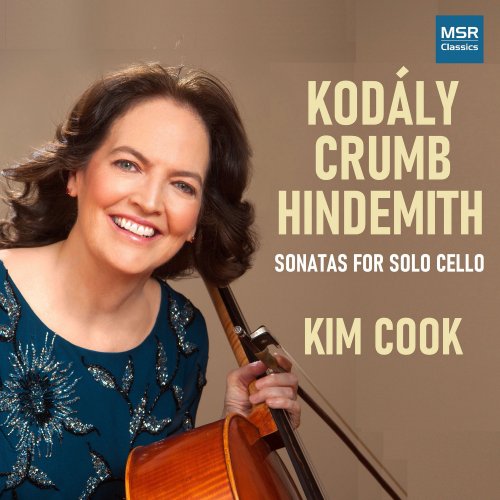Kim Cook - Kodály, Crumb and Hindemith - Solo Sonatas for Cello (2021)

Artist: Kim Cook
Title: Kodály, Crumb and Hindemith - Solo Sonatas for Cello
Year Of Release: 2021
Label: MSR Classics
Genre: Classical
Quality: flac lossless
Total Time: 00:54:50
Total Size: 229 mb
WebSite: Album Preview
TracklistTitle: Kodály, Crumb and Hindemith - Solo Sonatas for Cello
Year Of Release: 2021
Label: MSR Classics
Genre: Classical
Quality: flac lossless
Total Time: 00:54:50
Total Size: 229 mb
WebSite: Album Preview
01. Sonata for Solo Cello, Op. 8: I. Allegro maestoso ma appassionato
02. Sonata for Solo Cello, Op. 8: II. Adagio con gran espressione
03. Sonata for Solo Cello, Op. 8: III. Allegro molto vivace
04. Sonata for Solo Cello: I. Fantasia
05. Sonata for Solo Cello: II. Tema pastorale con variazioni
06. Sonata for Solo Cello: III. Toccata
07. Sonata for Cello Alone, Op. 25, No. 3: I. Lebhaft, sehr markiert
08. Sonata for Cello Alone, Op. 25, No. 3: II. Mässig schnell, Gemächlich
09. Sonata for Cello Alone, Op. 25, No. 3: III. Langsam
10. Sonata for Cello Alone, Op. 25, No. 3: IV. Lebhafte viertel
11. Sonata for Cello Alone, Op. 25, No. 3: V. Mässig schnell
An interesting web of connections exists among the selections represented here. In 1871, following the Franco-Prussian war, there was a revival in France to rally behind its musical tradition and indigenous composers. The National Society for Music, founded by the nation’s leading composers at the time, sought to champion performances of native composers and to legitimize French music – especially instrumental and orchestral French music – as serious art. Until 1871, a French composer’s worth was valued mainly by his ability to measure up to the Italianate and Germanic opera machines. According to Camille Saint-Saëns, founder and co-president of the National Society for Music, the public was not interested in anything home-grown before the war: “the name of a composer, at once French and living, printed on a poster had the effect of putting everyone to flight.” Saint-Saëns found traction for his ideas amongst his fellow composers, a long list of esteemed names that included Gabriel Fauré, a former pupil of Saint-Saëns and also a founding member of the Society, and Édouard Lalo, whose instrumental works were largely unnoticed before 1870. The Society was not merely a group of composers, however. Conductors such as Édouard Colonne and Charles Lamoureux helped to get new French music to venues and in front of a public that was suddenly thirsting for anything musically consumable. It would be Lamoureux that would give a young Pablo Casals his “big break,” inserting the Spanish cellist into a headlining role in his 1899 concert series. Casals would give his Paris debut performing Lalo’s Cello Concerto, and would follow up with a performance of Saint-Saëns’ Cello Concerto in December of the same year.
Kim Cook has performed as a soloist throughout the United States and in 27 countries worldwide, including Germany, Austria, Italy, the Czech Republic, Croatia, England, Ireland, France, Finland, Russia, China, Israel, Jordan and Latin America. She has served as an International Artistic Ambassador for the U.S. State Department. Television and radio broadcasts of Cook’s performances have been heard in Brazil, China and the United States. As a recording artist, she can
be heard performing concertos by Dvorák, Haydn, Tchaikovsky and Shostakovich and solo sonatas by Kodaly, Crumb and Hindemith. Cook was principal cellist of the São Paulo Symphony Orchestra under Eleazar de Carvalho and taught at New Mexico State University prior to her appointment as Professor of Cello at Penn State University. A native of Nebraska and a graduate of Yale University and the University of Illinois, she studied cello with Carol Work, Gabriel Magyar, Aldo Parisot, Alan Harris, and Janos Starker. Kim Cook performs on a cello made by Luigi Galimberti of Milan.
Valeri Vatchev studied at the Bulgarian Music Academy and in Vienna with Karl Österreicher. In 1993, he was appointed Principal Conductor and Music Director of the State Philharmonic Orchestra at Vratza, Bulgaria, and in 1998 was appointed Principal Conductor of the Philharmonia Bulgarica. Vatchev conducted more than 30 operas and 250 symphonic works, and led more than 100 world premieres of contemporary works by composers from Europe, Asia and the United States. He conducted on tour in Germany, Bulgaria and Greece in collaboration with BMG, and in Sofia for José Carreras. Vatchev has recorded for numerous labels, including BMG, Minerva, Fontec, Arcobaleno, Tonal, Wildflower, Summit, Albany and Polytropon, and also for radio, including National Radio Bulgaria, MDR, Radio Varna, Radio Craiova and KBS in South Korea. In Bulgaria, Vatchev organized and from 1996 to 2004 directed a national orchestral education program for children. Sadly, he passed away before this recording was completed.
Grigor Palikarov graduated from the State Academy of Music in Sofia, majoring in piano, conducting and composition. As a pianist, he gave solo recitals in Bulgaria and abroad, played with orchestras in Sofia, and recorded for the Bulgarian National Radio. He has written choral, orchestral and chamber music, and in 1994 won the special prize for composition of the Young Bulgarian Talents Foundation, named after Schnittke. Palikarov served as Chief Conductor of the
Ensemble of the Bulgarian Army, and has conducted the National Orchestra of Belgium in Brussels, National Opera of Ljubljana in Slovenia, New Tone Ensemble in Vienna, Bankya Chamber Orchestra and Opera Circle in Cleveland. Since 2001, he has been the Principal Conductor at the National Opera in Sofia and Assistant Professor at the State Academy of Music and Dance Arts in Plovdiv. Since 2005, Palikarov has served as General Artistic Manager of the Pazardjik Symphony Orchestra, and in 2008 was appointed as the principal conductor of the Classic FM M-Tel Symphony Orchestra in Sofia.
![Paul Mauriat - L'avventura (1972) [Hi-Res] Paul Mauriat - L'avventura (1972) [Hi-Res]](https://img.israbox.com/img/2025-12/19/q8l5an3pdrx7j3uta0q4cr2qi.jpg)
![Milton Man Gogh - Fully Stretched (2025) [Hi-Res] Milton Man Gogh - Fully Stretched (2025) [Hi-Res]](https://www.dibpic.com/uploads/posts/2025-12/1766080588_cover.jpg)



![Clifton Chenier - Bogalusa Boogie (1976) [Hi-Res] Clifton Chenier - Bogalusa Boogie (1976) [Hi-Res]](https://img.israbox.com/img/2025-12/20/qs86ek8wle134n43i1bkys5a3.jpg)

![Gonzalo Rubalcaba - Gonzalo Plays PIino (2025) [Hi-Res] Gonzalo Rubalcaba - Gonzalo Plays PIino (2025) [Hi-Res]](https://www.dibpic.com/uploads/posts/2025-12/1766206867_folder.jpg)
